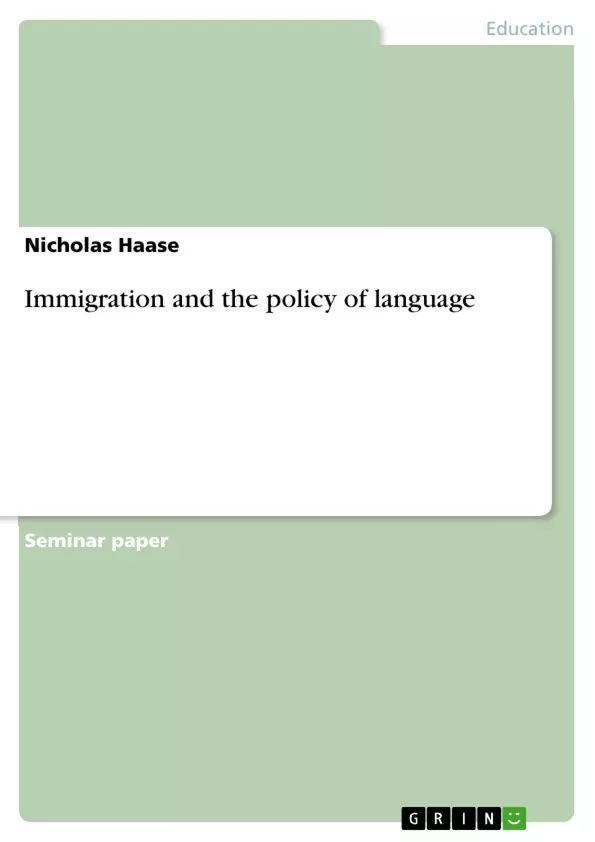1. Introduction
“What do you call a person who speaks two languages?“
“Bilingual“
“And one who knows only one?“
„American.“ (unknown)
The above joke, which source is unknown, is a stereotypical joke, not a rascist one. It mirrors a common perception about U.S.-born citizens all over the world. These stereotypes do not come out of nowhere, since the USA have a long history of immigration and the problems involved, e.g. language diversity, cultural differences and the forming of a melting pot.
Therefore the topic of immgration and the policy of language shall be analyzed in this term paper. First of all I want to give an overview why the proficiency of English was and still is important for immigrants in order to live at least a decent life or become very succesful within the US society.
Next I want to give a summary of the history of language policy and politics in the United States to show the commencements and recent developments of these politics. In the end I want to discuss the key issues of the battle over language, which cause great controversies all over the USA.
Inhaltsverzeichnis (Table of Contents)
- Introduction
- Why is the proficiency of English important for immigrants?
- A history of language policy and politics in the US
Zielsetzung und Themenschwerpunkte (Objectives and Key Themes)
The main objective of this paper is to analyze the importance of English proficiency for immigrants in the United States, taking into account the historical development of language policies and the ongoing debate surrounding them. The paper examines the role of English in immigrant integration, the impact of language policies on immigrant communities, and the challenges faced by immigrants in navigating a society where English is often considered the dominant language.
- Importance of English proficiency for immigrants
- Historical development of language policies in the US
- The impact of language policies on immigrant communities
- The debate surrounding English as the dominant language
- Challenges faced by immigrants in navigating a society where English is often the dominant language
Zusammenfassung der Kapitel (Chapter Summaries)
- Introduction: This chapter introduces the topic of immigration and language policy in the United States by highlighting the historical context and the stereotypes surrounding immigrants. It outlines the key questions that will be addressed in the paper, such as the importance of English proficiency for immigrants, the history of language policies, and the ongoing debate surrounding language issues.
- Why is the proficiency of English important for immigrants?: This chapter explores the importance of English proficiency for immigrants in navigating daily life and achieving success in the US society. It analyzes the challenges faced by immigrants in learning English, particularly first-generation immigrants, and the potential consequences of limited English proficiency. The chapter also discusses the role of English in bridging cultural differences and creating a common ground for communication.
- A history of language policy and politics in the US: This chapter provides a historical overview of language policies in the US, focusing on the last 100 years. It examines the emergence of language policies in response to various waves of immigration, the evolution of these policies over time, and the impact they had on immigrant communities. This chapter explores key events and legislation that have shaped the landscape of language policy, including the Dillingham Commission, the Immigration Act of 1917, the Emergency Quota Act of 1921, and the Civil Rights Act of 1964. It also discusses the English-only movement and its impact on the debate surrounding language issues.
Schlüsselwörter (Keywords)
The key topics and themes covered in this paper include: English proficiency, immigration, language policy, immigrant integration, cultural differences, social mobility, language politics, the English-only movement, assimilation, and the historical development of language policies in the United States.
Frequently Asked Questions
Why is English proficiency vital for immigrants in the US?
English proficiency is essential for navigating daily life, achieving social mobility, and integrating successfully into the US society and economy.
What is the "English-only" movement?
The English-only movement is a political effort to establish English as the sole official language of the United States, often sparking significant controversy.
How have US language policies evolved historically?
Policies have shifted in response to waves of immigration, from the restrictive Immigration Act of 1917 to the more inclusive Civil Rights Act of 1964.
What challenges do first-generation immigrants face regarding language?
First-generation immigrants often struggle with the transition to a new language while trying to maintain their cultural identity and secure employment.
What is the "melting pot" concept in this context?
The melting pot refers to the assimilation of diverse cultures and languages into a unified American identity, with English serving as the common ground.
- Citar trabajo
- Nicholas Haase (Autor), 2008, Immigration and the policy of language, Múnich, GRIN Verlag, https://www.grin.com/document/126645



